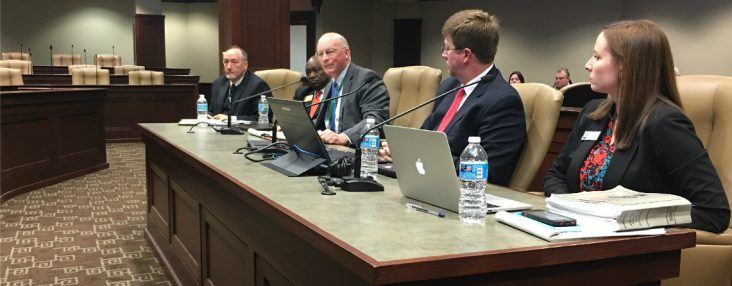Kurrus, others under state takeover testify
by January 11, 2016 9:42 pm 284 views

Baker Kurrus, Little Rock School District superintendent, testifies while Education Commissioner Johnny Key looks on. Also pictured from left are Dr. Richard Wilde, the Arkansas Department of Education’s program director for the School Improvement Unit; Andrew Tolbert, the ADEs director of the Office of Intensive Support; and Kendra Clay, ADE attorney.
The Little Rock School District must have broad-based community support, and if necessary, it could eventually ask for more money, but only if it can prove it’s spending the money it has wisely, Superintendent Baker Kurrus told members of the House and Senate Education Committees Monday.
The meeting included updates regarding Little Rock and the three other districts currently under state control: Pulaski County, Helena-West Helena and Dollarway.
Kurrus, a lawyer-businessman and former school board member, was appointed to head the district last January by Education Commissioner Johnny Key after the state took over the district because six of its schools were in academic distress.
He has been trying to bring more white students into the district, where they currently make up only 17% of the population. Kurrus has proposed a school in West Little Rock that will draw from three schools currently there. He said the district faces competition from the eSTEM Public Charter School and from other schools, but it can compete.
Asked by Rep. John Walker, D-Little Rock, if he believed that the district must have a large number of white students educated in areas where they live, Kurrus replied, “I do think it’s important to give students choices they will accept.”
Walker, a civil rights attorney, has filed suit against the state and district leaders alleging racial discrimination against black students in the takeover.
Kurrus was asked by Rep. Jim Sorvillo, R-Little Rock, whether the district would consider seeking a millage increase. He responded that the newly created Jacksonville School District is asking voters to increase its rate to 48.3 mills, while North Little Rock is already at that level. Little Rock is at 46.4.
“I don’t think I would ask anyone for anything unless and until I could say that we’re spending every dime that we get wisely and effectively,” he said. “And I’m not ready to make that public statement, although I will say we’re moving quickly in that direction, and then I think it becomes a community decision. … If we can’t provide for those students the same opportunities that other students have in surrounding communities, then it’s incumbent on us to tax ourselves and fulfill that commitment to them. And I’ll stand ready to make that decision as we proceed.”
He said the district lacked clear lines of communication, authority and responsibility when he arrived but is improving. Dr. Richard Wilde, the Arkansas Department of Education’s program director for the School Improvement Unit, said, “We would say they are moving from a compliance mentality to an improvement mentality.”
Andrew Tolbert, the ADEs director of the Office of Intensive Support, said that an analysis of J.A. Fair, McClellan and Hall High Schools found gaps in the schools’ systems, skills, services, structures and other areas. In each of the schools, there have been numerous leadership changes accompanied by a lack of standard operating procedures, a lack of collaboration between high schools and feeder schools, and other issues.
Legislators also heard from Pulaski County superintendent Dr. Jerry Guess and Helena-West Helena Superintendent John Hoy. Both districts are in year five of a state takeover. By state law, if they do not achieve independence this year, the State Board of Education must vote to consolidate or annex them with another district or reconstitute them, or change the superintendent or school board.
Both were appointed to their posts after the districts were taken over. Pulaski County’s situation arose after an audit found improper practices, and then the district began suffering from declining fund balances that dipped from $8 million in 2008 to $2 million in 2010 before rebounding to $18 million by 2015.
At the same time the district has been in state takeover, it’s also been disentangling itself from a decades-long desegregation case – a goal that was achieved with help from the separation by Jacksonville from the rest of the district – the state’s first ever detachment, Guess said. However, the district will see $20.8 million less a year because of the ending of state desegregation payments, and the loss of 4,000 Jacksonville students will result in about $40 million less in state foundation funding.
